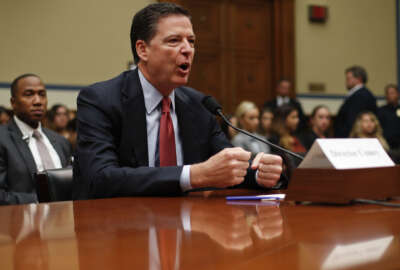

A 2016 law was supposed to, at last, give FBI whistleblowers the protections most other federal employees have. But three years after the bill's passage, at lea...
Best listening experience is on Chrome, Firefox or Safari. Subscribe to Federal Drive’s daily audio interviews on Apple Podcasts or PodcastOne.
When Congress passed a new bill designed to extend some protections to FBI professionals back in 2016, a longtime whistleblower and former employee of the agency was hopeful he would, at last, have his day in court.
Darin Jones, a former GS-15, was fired back in 2012 from his position after he made at least eight disclosures of what he believed were violations of FBI procurement law and the Federal Acquisition Regulation (FAR) to his supervisors. He appealed his termination with the Justice Department inspector general and submitted his case to the Merit Systems Protection Board.
But the Department of Justice dismissed Jones’ case because he disclosed his complaints to his own supervisors — not one of the nine top-level FBI or DoJ officials. This little-known rule didn’t apply to whistleblowers at any other agency.
Congress back in 2016 attempted to correct this scenario. It passed the FBI Whistleblower Protection Enhancement Act (FBI WPEA), which expanded the list of appropriate officials who could receive protected disclosures to include an employee’s direct supervisor.
Jones and the attorneys at the National Whistleblower Center who have advocated for him thought the 2016 law would, at the very least, give him another shot.
He again asked DoJ — the department had previously denied his whistleblower retaliation case the very week the FBI WPEA became law — to rehear his case.
After all, his case was used as a textbook example to convince a bipartisan group of lawmakers of the need to change FBI whistleblower law, David Colapinto, founder and general counsel at the National Whistleblower Center, said.
“The Justice Department dismissed his case before the law took effect,” Colapinto said. “[It has] ever since refused to apply the law to the guy whose case was used as an example to change the law.”
But it hasn’t, even as several members of Congress have familiarized themselves with the lengthy proceedings of Jones’ case and spent much of 2019 advocating on his behalf.
Sens. Ben Cardin (D-Md.) and Chris Van Hollen (D-Md.), along with Rep. Jamie Raskin (D-Md.), all wrote to the Justice Department IG , Michael Horowitz, last March, urging him to review whether the FBI had fired Jones in retaliation for blowing the whistleblower.
“At the time Mr. Jones made these concerns known, an employee’s supervisors were not among the recipients who could receive a disclosure that would trigger whistleblower protections,” they wrote. “Regardless of the jurisdictional issues, it is in the interest of the Department of Justice to determine whether officials within the FBI are terminating employees for whistleblowing.”
Horowitz responded the following month. His office, he said, had done all it could.



“While I understand that this is not the outcome Mr. Jones is seeking, I want to assure you that we have done everything that we can to facilitate a careful review of Mr. Jones’ concerns, including his underlying disclosures of waste, fraud and abuse,” Horowitz added.
Raskin last summer said he remained concerned a “clear and convincing investigation” of Jones’ disclosures hadn’t been undertaken.
“Notwithstanding the jurisdictional interests of OARM and the Office of Inspector General, whistleblowers should be afforded the utmost protection, and it is far from clear that Mr. Jones received it,” Raskin wrote in a July letter to Horowitz.
Written appeals from three members of Congress, however, have done little to change the status of Jones’ case — or the law, which Jones, congressional staffers and attorneys at the National Whistleblower Center all say must be revised to grant FBI whistleblowers the right to have their cases heard in a court of appeals
“That is the only route I have to get justice for my case,” Jones said. “There’s nowhere to go. You can’t appeal to anyone.”
The FBI whistleblower bill that eventually became law in 2016 was a mere shadow of the legislation Sens. Chuck Grassley (R-Iowa) and Patrick Leahy (D-Vt.) initially spearheaded several years ago.
The original version of their bill, which had unanimously passed the Senate Judiciary Committee and the full House back in 2016, would have given FBI whistleblowers the right to petition a decision from the Justice Department in a court of appeals.
In addition, the original FBI whistleblower bill would have included specific procedures for filing, investigating and adjudicating retaliation complaints.
In the days before Congress left town for holiday recess, senators learned — despite the the bill’s previous bipartisan showing — the FBI WPEA wouldn’t be able to clear a vote under unanimous consent in the Senate.
President Barack Obama signed the truncated version of the FBI whistleblower protection bill into law in December 2016.
“It’s severely incomplete,” Jones said of the FBI WPEA. “My case clearly shows the law doesn’t provide justice for FBI whistleblowers or even the opportunity for whistleblowers to have justice.”
Grassley’s disappointment in the 2016 FBI whistleblower law was evident.
“We also wanted to be sure that FBI employees had opportunities for a fair and independent hearing, and the ability to seek relief from a court of appeals. In that case, at least someone outside would be able to hold the department and the FBI accountable,” he said back in 2016, shortly after the truncated FBI WPEA cleared the Senate under unanimous consent. “But behind the scenes, the FBI and the Justice Department objected to these provisions, although they never provided any official written comment on the bill. They claimed our reforms would jeopardize national security. But they never, ever said how.”
Grassley named Jones as one of the FBI whistleblowers who had inspired the 2016 bill, and he has also asked DoJ to reopen the case.
But three years after the passage of the 2016 bill, Jones remains hopeful Congress will revisit whistleblower protections for current and former FBI employees.
“My case is the case to use as an example for why the FBI WPEA needs to be reintroduced,” he said.
But it seems there’s little appetite — at least at this exact moment — to revive the long and politically contentious conversations needed to address the quiet concerns that initially blocked the FBI whistleblower protection bill from achieving its full potential back in 2016.
“We need to revisit it, but the problem is what you’re hearing from the Hill,” Colapinto said. “It’s difficult to get them to spend their limited time on this if it’s just going to go down the tubes the way it did last time.”
For Jones, his case has been languishing for nearly eight years. And though Jones is an attorney and has been able to represent himself, he said the entire process has been a financial and emotional burden on him and his family.
A 2015 Government Accountability Office report found that Jones’ case is often the norm, not the exception. Some FBI whistleblower cases took as long as 10 years to resolve.
“We have to try again to pass the larger bill,” Colapinto said. “Because not having the full rights that other employees have, including judicial review, is a sham. These cases sit around for years and years and years.”
Copyright © 2024 Federal News Network. All rights reserved. This website is not intended for users located within the European Economic Area.
Nicole Ogrysko is a reporter for Federal News Network focusing on the federal workforce and federal pay and benefits.
Follow @nogryskoWFED
